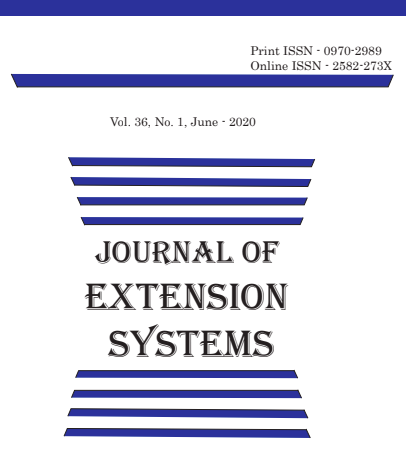Participation of Rural Women in Production and Processing Activities of boro Rice Cultivation in Jashore District
DOI:
https://doi.org/10.48165/jes.2021.37.2.3Keywords:
Participation, rural women, production, processing, boro riceAbstract
Agriculture was introduced in the hand of women. Women’s role is confined mostly to processing activities and they are ignored in the case of production activities. The study was conducted to determine the extent of participation in the production and processing activities of boro rice by the rural women in Mangalkot union of Jashsore district of Bangladesh. Data were collected on the participation of rural women in production and processing activities of boro rice cultivation along with their selected characteristics from randomly selected 116 rural women during April -May 2017 by using an interview schedule through personal interview. The majority (63.8%) of the respondents participated in production activities while most (89.7%) of them participated in processing activities of boro rice cultivation to a different extent. But 36.2% and 10.3% of them did not participate in the production and processing activities of boro rice cultivation respectively. The participation of rural women was significantly higher in processing activities than that of production activities (t=0.024**). Among 15 (6 productions + 9 processing) activities, the women participated to the highest extent in cleaning followed by boiling and drying, while it was least in the case of irrigation. Among twelve characteristics of the respondents, only farm size and annual family income showed a significant negative relationship with their extent of participation in production activities while farm size, annual family income, and cosmopoliteness showed similar relationships with participation in processing activities. Besides, organizational participation showed a significant positive relationship with their extent of participation in both production and processing activities. Similar results were also found in the case of overall participation. The participation of rural women should be encouraged in the case of production activities through different motivational activities.
Downloads
References
Ahmed, M.B., K.R. Mondal, A. Debnath, M.N. Islam, and M.R. Amin (2008). Participation of women in income-generating activities under ASA at Dumuria Upazila of Khulna district. Journal of Agricultural Education and Technology. Dhaka: Agricultural Educators Forum. 11 (1&2):95–102.
Abdullah, T. A. (1983). Report on Homestead Agricultural Production in Rural Bangladesh. The Ford Foundation, Dhaka. Adnan, S., A. Barrett, N. Alam and S.M.A. Brustinow. 1992. People's Participation: NGOs and the Flood Action Plan. Dhaka, Bangladesh: Research and Advisory Services.
Abdullah, T.A. (1985). Women in Rice Farming Systems in Bangladesh and How Technology Programs Can Reach Them. In: Women in Rice Farming. Gower Publishing Company Ltd, Aldershot England and International Rice Research Institute, Philippines.
Abdullah, T. A. and Zeidenstein, S. (2002). Village Women in Bangladesh: Prospects for Change. A study prepared for the International Labor Office within the framework of the World.
BBS (Bangladesh Bureau of Statistics) (2014). Statistical Year Book of Bangladesh. Ministry of Planning, Government of the People’s Republic of Bangladesh: 33–36.
Bangladesh Finance Bureau (2014). Agricultural Statistics. Ministry of Agriculture, Government of the People’s Republic of Bangladesh.
Bhuiya, E.H. (2010). Participation of Rural Women in Post-harvest Activities in Maize Cultivation under Barakhata Union of Lalmonirhat District. MS. (Ag. Ext. Ed.) Dept. of Agricultural Extension Education. Bangladesh Apicultural University, Mymensingh
Damisa, M.A, and Yohanna M. (2007). Role of rural women in farm management decision-making process: Ordered probit analysis, World Journal of Agricultural Sciences, 3 (4): 543, IDOSI publication.
Duflo, E. (2012). Women Empowerment and Economic Development. Journal of Economic Literature, 50 (4):1051–1079.
FAO (Food and Agriculture Organization) (2010). FAOs Information System on Water and Agriculture. http// www.fao.org/nr/water/aquastat/countries_regions/ Bangladesh.
Fabiyi, E.F, Danladi, B.B., Akande KB, and Mahmood Y, 2007: ‘Role of Women in Agricultural Development and their constraints’, Pakistan Journal of Nutrition; Vol. 6 (6) pp. 676-678.
Fontana M. and C. Paciello. 2009. Gender Dimensions of Rural and Agricultural Employment: Differentiated Pathways out of Poverty, A Global Perspective. Paper presented at the FAO-IFAD-ILO Workshop on Gaps, trends and current research in gender dimensions of agricultural and rural employment: differentiated pathways out of poverty. Rome, 31 March - 2 April, 2009.
Hoque M. and Itohara Y. (2008). Participation and decision-making role of rural women in economic activities: A comparative study for members and non-members of the micro-credit organizations in Bangladesh, Journal of Social Sciences, 4(3):229-36.
Hossain M. and Bayes, A. (2009). Rural Economy and Livelihoods: Insights from Bangladesh. A. H. Developing Publishing House, Dhaka, Bangladesh.
Islam M. R. (2002). Involvement of BRAC Trained Women Beneficiaries in Income Generating Activities and Decision making Role. MS (Ag. Err. Ed.) Thesis, Dept. of Agricultural Extension Education, Bangladesh Agricultural University, Mymensingh.
Islam M. A., Ahmed M.B. and Islam M.M.. (2018). Participation of rural women in activities related to homestead vegetable cultivation at manirampur upazila under Jessore district. J. Bangladesh Agril Univ. 16(1): 17-22
Jaim W. M. H and Hossain M. (2011).Women’s Participation in Agriculture in Bangladesh 1988-2008: Changes and Determinants. Paper presented in the pre-conference event on “Dynamics of Rural Livelihoods and Poverty in South Asia”, 7th Asian Society of Agricultural Economists (ASAE) International Conference Hanoi, Vietnam, October 12, 2011.
Nain, M.S. and Kumar, P. (2010). A Study of Women Participation and Decision Making in Farm Management. Journal of Community Mobilization and Sustainable Development,5 (1): 67-71.
Rahman. M. (2008). People's Participation in Coastal Biodiversity Management Activities in ST. Martin‘s Island under CWBMP. MS. (Ag. Ext. Ed.) Thesis. Dept. of Agricultural Extension Education. Bangladesh Agricultural University, Mymensingh.
Rejula K. Singh R., Nain M.S. (2017). Rice farming for food security and ecological sustainability: An analysis of farmers’ awareness in Kerala. Indian Journal of Extension Education, 53(4):101-106.
Risignbd.(2014.www.risingbd.com/english/Rice_production_reaches_34449_million_ton_in_FY_2013-14/16217.
Singh D., Nain M.S, Hansra B.S., Raina V. (2011) Trends in Non-Basmati Rice Productivity and Factors of Yield Gap in Jammu Region . Journal of Community Mobilization and Sustainable Development, 6 (1): 59-64
Downloads
Published
Issue
Section
License

This work is licensed under a Creative Commons Attribution-NonCommercial-NoDerivatives 4.0 International License.

